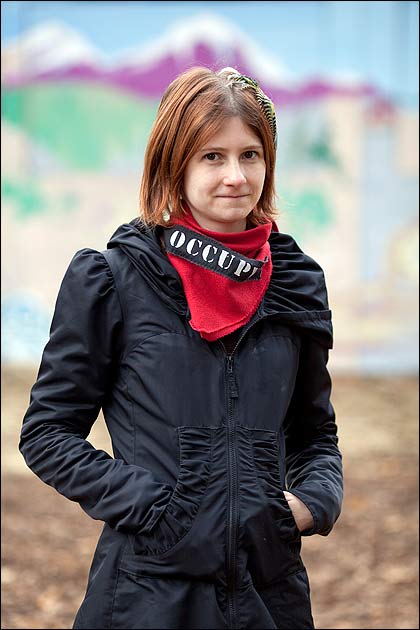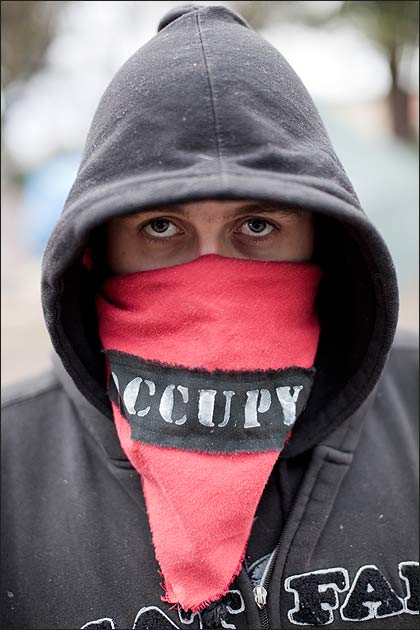 |
| Alley Valkyrie |
“The universe always provides,” said Hobit, a member of the Street Family Alliance (SFA) as he packed up his things at Occupy Eugene on Dec. 20. Hobit, who said he is 18 and has been on the road for the past four years, is one of the many street kids who found a home at the camp.
Rayne, another SFA member, said the alliance is new. Before the Occupy Wall Street-inspired Occupation at Washington-Jefferson Park, the different street families — the Juggalos, Pirates and Grateful Dead Family — didn’t get along and sometimes fought. But Rayne said since joining forces at Occupy and forming the SFA, “there hasn’t been any incidents that I am aware of” that were caused by SFA members.
The Eugene City Council held an emergency meeting Dec. 20 and voted to revoke the extension of OE’s camping permit. Betty Taylor and George Brown voted against the revocation. The council’s vote was brought on by what the Eugene Police Department said were increasing incidents at the camp, including a fight that resulted in a man being taken to the hospital. The man, Rick Youngblood, was a not a member of the camp, according to Terry, a firefighter who has been volunteering at the camp. Terry and a police officer worked together to give Youngblood lifesaving CPR.
The eviction hurts, Terry said, because the incident actually showed “we work well together.” He said several of the incidents written up as assaults in the police report that led to the council vote were merely arguments without physical violence.
A Dec. 16 letter from the police union to Mayor Kitty Piercy and the City Council said, “We are not against the Occupy Movement in the least,” but alleged “there are human feces, vomit and other biohazards on the muddy paths that our officers are forced to walk on.” EW reporters did encounter some mud, but feces and vomit were not in evidence on visits to the Occupy camp. The letter demanded the camp be disbanded.
Alley Valkyrie, an organizer who has been spending nights at Occupy Eugene, said, “It’s disgusting the way they’ve used this” to shut down the camp. She said the camp had set up its own “peacekeepers” to deal with problems, and that there was less, not more crime compared to when the homeless population was spread around town.
“I don’t sleep here,” Valkyrie said, laughing. “I’m up all night.” She said in recent days the crackdown on fires had made the camp colder, and the stadium lighting the police put up and increased patrols were “psychological warfare.”
EPD spokeswoman Melinda McLaughlin said, “The lights were placed there to make it safer at the Washington-Jefferson Park for those who visit or are camping in the park, as well as for city staff responding to, or staffed to, perform public safety duty at the park.”
A search of local news reports over the past several years shows that long before Occupy Eugene began its camp, Washington-Jefferson Park had a reputation for harboring drug users and transients. In 2009 a homeless man was stabbed and killed in the park. That same year another homeless man was killed at Skinner Butte. Dec. 16 marked the three-year anniversary of the death of Major Thomas Egan, who froze to death on a dead-end street in Eugene.
“Shut down before Christmas. How crude,” Greg Nagle said. Nagle holds a doctorate in watershed science from Cornell and had been volunteering washing dishes at the camp.
According to Valkyrie, one of the extraordinary things Occupy has done is bring the street families together and let street kids learn from older activists, and the activists in turn learn from the street families.
“A Ph.D. stands next to a homeless kid and they both have an equal say and an equal vote,” she said.
At 28, Rayne is one of the oldest of those in SFA and said that before the camp the kids were sleeping under bridges, by the river, on the street, in dumpsters and anywhere else they could find shelter. Rayne said a Eugene street family is formed by kids on the street who have similar backgrounds, interests and even taste in music. Valkyrie, who spent time on the street as teenager, said the street families look out for each other and keep each other safe. When they became part of Occupy Eugene, they became politicized and formed an alliance.
“That’s what the police were afraid of,” Valkyrie said, “empowering disenfranchised people.”
Angie, who had been volunteering in the Occupy kitchen, was chatting with some of the street family youth as they packed their belongings on the cold, damp December afternoon. Angie said she had worked in a local rehab center and knew many of the SFA members from hanging out on the street. She said among the issues with homeless services in Eugene is that people, especially those with disabilities, don’t know where to reach out and get help. The Occupy camp provided a place where people felt more comfortable, she said, and where they didn’t feel judged.
Valkyrie agreed. Social service agencies “often make people feel like they’ve done something wrong,” she said, and are patronizing.
“What’s going to happen to Hobit?” Valkyrie asked in frustration. “These people are not clients,” she said. “They don’t need services. They need community.”
As EW went to press, police and OE representatives negotiated the process for dismantling the camp. Chief Pete Kerns characterized Occupy representatives as cooperative and said officers are exercising discretion as campers pack the now-closed park.
Occupy Eugene’s general assembly, which operates by consensus, voted Dec. 20 to ask to have continued access to the site to work on cleaning it up after the group has left, and to rehabilitate the park themselves with input from a city horticulturist. The group also voted to rent office space at the Growers Market and at 7th and Polk.
Several Occupiers have mentioned offers from Occupy Portland and Salem to come and join in civil disobedience protesting the eviction. “The official Occupy Eugene response to the eviction by the city of Eugene will be nonviolent,” an OE press release said, which added, “The Occupation will continue with or without camp.”
Many Occupiers, like other activists, asked not to give last names for security reasons.
• Photographs by Rob Sydor
